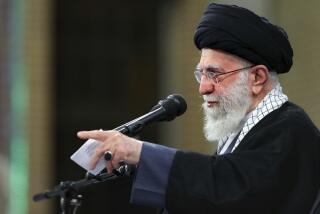U.S. Planning Possible Retaliation for Saudi Attack
- Share via
WASHINGTON — The United States is planning possible punitive actions against Iran, including retaliatory strikes on military targets, and could act if a Saudi theory proves true--that Iran was responsible for a June 25 bombing that killed 19 American troops, sources say.
U.S. law enforcement and Pentagon officials have tentatively concluded that Saudi Shiites were responsible. But they cautioned that the conclusions are preliminary, noting that Iran and Syria were tentatively thought responsible for the 1988 bombing of Pan American Airways Flight 103 over Scotland--a belief later found to be wrong. Two Libyans have been named as suspects in that incident.
“A lot of people would like to bash Iran, and the Saudi case fuels their desire to do it,” a senior U.S. law enforcement official said Wednesday. “But any conclusion, not to mention any action, is very premature.”
U.S. officials are saying they still lack sufficient proof to support Saudi Arabia’s contention that Saudi Shiites--trained, supported, financed and armed by Iran--are behind the deadly attack on the Khobar Towers military housing complex in Dhahran. The Saudis claim that those responsible met with Iranian intelligence and traveled to Iran.
Although the Pentagon always maintains contingency plans for counterstrikes and defense of strategic interests, senior U.S. officials said the current, “well-advanced” planning is for a tailor-made reply to Iran’s long record of sponsoring extremism in the region, with the Khobar bombing in mind.
Ultimately, the president decides from a list of options. But the current military list includes strikes on facilities that would send “a powerful and specific” message to Tehran, the sources added.
On the diplomatic front, the list includes a call for the most punitive international sanctions imposed since the 1979-81 hostage ordeal, when Iran was ostracized and isolated by the outside world. Among the recommendations is the proposal for a United Nations resolution that would ban all arms sales and nuclear technology transfers to Iran and reduce the number of personnel allowed at Iran’s diplomatic missions abroad.
Officials said the plans support broader U.S. objectives in dealing with Iran, specifically to weaken its military buildup of weapons and to disrupt its propaganda and sabotage campaigns, which are often run out of embassies.
As in previous terrorism cases, U.S. officials said that the vague Iran link so far is indirect, tied more to Tehran’s influence on Shiite brethren in the adjoining Arab world than to direct instigation of the attack. “We’re a long way from saying that Iran knew about the bombing in advance, ordered it or gave the green light,” a Pentagon official said. “We have no evidence of that.”
For weeks, Saudi Arabia has been trying to persuade the U.S. that the powerful truck bomb was the work of Hezbollah, the amorphous Party of God that allegedly has loosely linked branches among Shiites in Lebanon, West Africa and the Persian Gulf.
Saudi investigators--headed by Prince Nayif ibn Abdulaziz, interior minister and brother of King Fahd--contended that the movements of the bombers can be traced through Lebanon’s eastern Bekaa Valley, which is a hotbed of Shiite activism, a base for Iranian Revolutionary Guards and under the control of Syrian troops.
The critical difference between Washington and Riyadh is evidence. The Saudi version of events is based largely on information and alleged confessions obtained as a result of one of the kingdom’s largest sweeps of Shiite activists and suspected dissidents in 15 years, U.S. officials said.
Hundreds of Shiites are believed to have been picked up, mainly in Saudi Arabia’s eastern province, where long-standing tensions resulted in unrest in 1980-81. Several dozen are still being held, U.S. officials said.
But both U.S. law enforcement and military officials contended that much of the Saudi information, so far, is suspect or inadequate. “The standards by which much of it was obtained are questionable,” said a leading counter-terrorism official. “If you use certain methods, you can get anything you want.”
Riyadh has often been criticized by U.S. and human rights groups for torture, lack of due process, and mass and prolonged detentions.
Meantime, the Air Force general in charge of the base in Saudi Arabia where the airmen were killed has been cleared of culpability in the terrorist bombing, a senior Pentagon official said Wednesday. The finding on Brig. Gen. Terryl J. Schwalier was in a report issued by Lt. Gen. James Record, who was given the authority to decide whether Schwalier should be disciplined or face court-martial proceedings, the Associated Press said.
Defense Secretary William J. Perry ordered the probe in September, after the release of a report by retired Army Special Forces Gen. Wayne Downing that criticized Schwalier for failing to take action to protect his troops.
More to Read
Sign up for Essential California
The most important California stories and recommendations in your inbox every morning.
You may occasionally receive promotional content from the Los Angeles Times.













